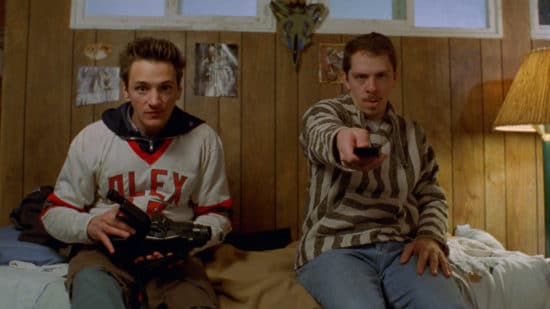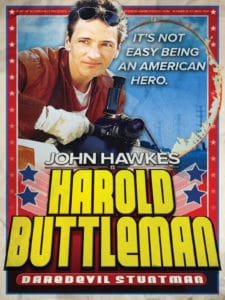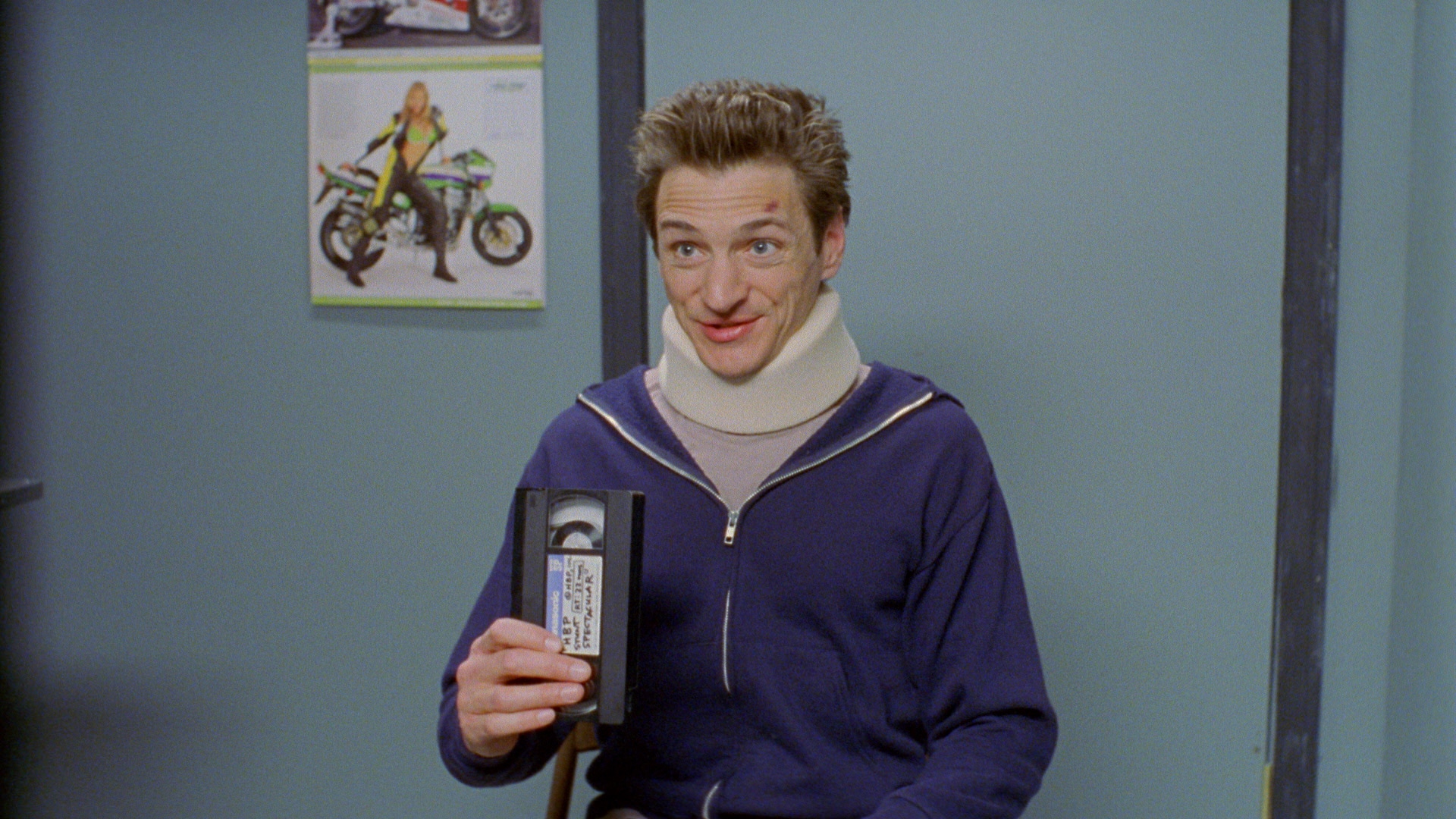 John Hawkes is a pretty fascinating figure in film. For many years, he was most likely to be known for his brief appearance as the liquor store guy in the first scene of From Dusk Till Dawn; or, if you’re a real Robert Rodriguez completist, for his scene-stealing supporting turn in Roadracers. However, more recent years have seen him take on considerably more serious work to major acclaim, like Winter’s Bone (which won him an Oscar nomination), Martha Macy May Marlene, and most recently a small but hugely impactful role in Three Billboards Outside Ebbing, Missouri. That latest one in particular gave me pause, as Hawkes played Frances McDormand’s ex-husband, which – and I apologise in advance for my unwitting sexism – initially struck me as a bit off, as he seems so much the younger of the two. However, Hawkes is actually only a year younger than McDormand, 58 at the time of writing.
John Hawkes is a pretty fascinating figure in film. For many years, he was most likely to be known for his brief appearance as the liquor store guy in the first scene of From Dusk Till Dawn; or, if you’re a real Robert Rodriguez completist, for his scene-stealing supporting turn in Roadracers. However, more recent years have seen him take on considerably more serious work to major acclaim, like Winter’s Bone (which won him an Oscar nomination), Martha Macy May Marlene, and most recently a small but hugely impactful role in Three Billboards Outside Ebbing, Missouri. That latest one in particular gave me pause, as Hawkes played Frances McDormand’s ex-husband, which – and I apologise in advance for my unwitting sexism – initially struck me as a bit off, as he seems so much the younger of the two. However, Hawkes is actually only a year younger than McDormand, 58 at the time of writing.
This means that Hawkes was already well into his forties when Harold Buttleman: Daredevil Stuntman (also known as simply Buttleman) was made. Remarkable, given that he looks twenty years younger, and the character certainly seems to fit that age group. Still, as the film itself demonstrates, there’s no age limit on chasing dreams – or, alas, seeing those dreams broken.
I’ll confess to having been completely unaware of Harold Buttleman: Daredevil Stuntman – the first, and to date only film from writer-director Francis Stokes – until word reached me of its upcoming VOD release. In terms of plot and character, we might find some common ground with another recent critical darling, The Disaster Artist, but it strikes me as being closer at heart to that old comedy drama classic, Billy Liar; it’s the tale of a small-town guy who dreams of getting out and making it big, yet is sorely lacking when it comes to the skill, the knowledge, and above all the self-awareness to make it happen.
 Hawkes, as you might have ascertained, plays the title role; a young-ish man who lives in his parent’s basement and works as a tuxedo fitter, but who harbours a lifelong dream of becoming a superstar stunt performer in the vein of Evel Knievel. His day to day life is pretty normal: going to work, hanging out drinking with his buddies, going out on humdrum dates with his girlfriend Wendy (Anita Barone). It’s just that, whenever he has down time, Harold and his best friend Doug (Stephen Falk) are out planning his next daredevil feat to capture on camcorder, with the ultimate goal of putting together a pilot episode for a TV show which they hope will catapult them to fame and fortune. The problem is, Harold and his friends don’t actually know the first thing about stunt work. Yet through it all, Harold remains perpetually optimistic that the big break is on the horizon. The clock’s ticking, though, as Harold’s parents (Leon Russom, and the sadly missed Karen Black) need him to move out, and Wendy is getting a little impatient with his dreaming and wants him to make the traditional honest woman out of her.
Hawkes, as you might have ascertained, plays the title role; a young-ish man who lives in his parent’s basement and works as a tuxedo fitter, but who harbours a lifelong dream of becoming a superstar stunt performer in the vein of Evel Knievel. His day to day life is pretty normal: going to work, hanging out drinking with his buddies, going out on humdrum dates with his girlfriend Wendy (Anita Barone). It’s just that, whenever he has down time, Harold and his best friend Doug (Stephen Falk) are out planning his next daredevil feat to capture on camcorder, with the ultimate goal of putting together a pilot episode for a TV show which they hope will catapult them to fame and fortune. The problem is, Harold and his friends don’t actually know the first thing about stunt work. Yet through it all, Harold remains perpetually optimistic that the big break is on the horizon. The clock’s ticking, though, as Harold’s parents (Leon Russom, and the sadly missed Karen Black) need him to move out, and Wendy is getting a little impatient with his dreaming and wants him to make the traditional honest woman out of her.
Although Stokes’ film first hit screens in 2003, you’d be forgiven for thinking it was made a decade earlier. It’s very much in the 1990s American indie mould, aesthetically reminiscent of early Richard Linklater and Kevin Smith, with a quaint beauty that you don’t necessarily see today, in large part because Stokes shot it on good old fashioned 35mm; credit due to cinematographer Thomas Hargis. Given how often such grounded, character-based comedy dramas (I’m reticent to use the word ‘dramedy’) tend to take a very warts and all, kitchen sink approach and dwell on the darkness and underlying misery of the struggling dreamer, it’s very refreshing that this is, for the most part, a much more upbeat affair. As patently deluded as he is, Harold is such an affable, well-meaning character that you can’t help but root for him. Not unlike Tom Courtenay’s Billy, Johnny Depp’s Ed Wood, or even Ardal O’Hanlan’s Father Dougal before him, Hawkes plays Harold not as an idiot, but as childlike enthusiast, unwitting in his naivety, but certainly not meaning any harm to anyone.
Beyond the title character, Stokes paints a picture of small town life that’s similarly affectionate, whilst also quietly critical. The key to it all is, while Harold is clearly lacking in skill as a stunt performer, all those around him either refrain from telling him so, or fail to recognise it themselves. As Harold’s best friend and cameraman Doug, Stephen Falk (who has since worked worked more as a screenwriter, including stints on Weeds and Orange is the New Black) plays the role with a similar naivety, so swept up in his friend’s commanding nature that he too believes success is coming their way; likewise Stephanie Markham as Nettie, Doug’s little sister and Harold’s self-professed biggest fan. The two of them support and believe in Harold unconditionally, whilst Harold’s girlfriend and parents simply grin and bear it, dropping increasingly less subtle hints that he should give it all up and pursue a more normal career, as befits their very normal existence.
Though it’s evident from the start that things are not going to go the way Harold thinks, there’s still something of a unexpected, and not entirely palatable tonal shift in the final scenes. Obviously I’m not going to go into specifics, but to go back to my earlier Kevin Smith comparison, the conclusion of Harold Buttleman: Daredevil Stuntman reminds me somewhat of the original ending of Clerks: Smith’s first cut went out on a major downer which felt rather misplaced given how light-hearted things had been beforehand. The contrast is not quite so jarring here; again, a less-than happy ending has been signposted from early on, and thematically it makes sense, plus things are left just that bit open enough to suggest it might not be as bleak as it seems. Even so, the climax doesn’t paint a sunny picture of how things generally turn out for those who pursue a creative path, and is likely to hit home with those of us who have made such unlikely goals our life’s endeavour.
Even so, just because a film doesn’t offer total feel-good vibes from start to finish doesn’t mean it shouldn’t be seen and celebrated. This is a charming, endearing, very relatable piece of work, and it’s a shame it hasn’t had a chance to reach a wider audience before now; all being well, that will change now.
Also, fair play to Hawkes, who is credited as having performed all his own stunts in the movie. It might not be Evel Knievel level, but a lot of it must have taken some balls.
Harold Buttleman: Daredevil Stuntman is released on iTunes, Amazon and Google Play from 2nd February.
